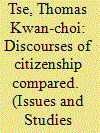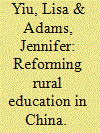|
|
|
Sort Order |
|
|
|
Items / Page
|
|
|
|
|
|
|
| Srl | Item |
| 1 |
ID:
130633


|
|
|
|
|
| Publication |
2014.
|
| Summary/Abstract |
Configurations of citizenship are often reflected in school knowledge which contains normative and pedagogical discourses. Changes in the citizenship curriculum also capture the socio-political transition of a society. Drawing on textual and content analysis, this article presents a comparative analysis of the relevant textbooks at the junior high level in Mainland China and Taiwan in the late 1990s with regard to the portrait of a good citizen. It is concluded that the mainland's materials, combining socialist and republican models of citizenship, tend to teach their students to be patriots with good psychological quality, legal compliance, moral integrity, lofty ideals, an enterprising spirit and a distinguished sense of social responsibility for "socialist modernization construction" and national revival, while Taiwan's materials, more in a manner of liberalism and communitarianism, emphasize personhood, human rights values, public spiritedness, and civic competence, which lay a foundation .for sustaining a budding democracy and civil society
|
|
|
|
|
|
|
|
|
|
|
|
|
|
|
|
| 2 |
ID:
124896


|
|
|
|
|
| Publication |
2013.
|
| Summary/Abstract |
The Chinese state's commitment to improve teaching quality in rural regions is a key component of national efforts to close the rural-urban education gap. In this paper, we investigate an understudied but critical dimension of quality teaching: teacher expectations. We employ longitudinal data gathered in Gansu Province in 2000 and 2007 to first examine whether teacher expectations for rural youth are conditioned by students' social origin and teacher background characteristics. Next, we determine the predictive accuracy of their expectations. Our results highlight the ways in which teacher expectations condition the sorting of rural children among different schooling tracks with distinct life trajectories. Significantly, teachers are more likely to hold lower expectations for students from disadvantaged backgrounds. In addition, non-local teachers hold lower expectations for rural children compared to local teachers. Finally, a low percentage of teachers expect students to enrol in post-compulsory vocational education. We consider the implications of these results for both educational policy and social inequality.
|
|
|
|
|
|
|
|
|
|
|
|
|
|
|
|
| 3 |
ID:
133812


|
|
|
|
|
| Publication |
2014.
|
| Summary/Abstract |
To win the hearts and minds of the Chinese people, Chinese Communist leaders launched a series of educational reforms to instill new socialist ideas and nationalistic fervor in kindergarteners immediately after the founding of the People's Republic of China in 1949. Under the strong influence of Soviet advisers and through a number of methods (games, singing, storytelling, site visits), Chinese kindergarteners were taught the nobility of labor, the sacrifice of soldiers, the grandeur of Tiananmen Square, the wise leadership of Chairman Mao Zedong, and the evilness of enemies. However, contrary to the conventional view, this article argues that Chinese education officials and kindergarten teachers never blindly followed Soviet educational models. They appropriated Moscow's techniques to suit their domestic needs, which included promoting nationalist feelings among children to consolidate the Chinese Communist Party's legitimacy and power. Ultimately, Chinese kindergarteners were turned into Party loyalists, not admirers of a foreign socialist model. Although the Party encountered difficulties in recruiting reliable teachers to implement its policies, it was able to impose nearly total control from above over the political content of kindergarten education. Under the one-party system, Chinese children were only taught what the Communist leaders wanted them to learn.
|
|
|
|
|
|
|
|
|
|
|
|
|
|
|
|
|
|
|
|
|